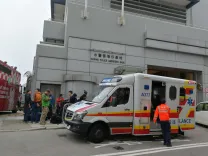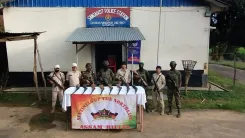Is ISI Planning to Shift Terror Bases to Khyber Pakhtunkhwa?

Synopsis
Key Takeaways
- Operation Sindoor has significantly impacted terror infrastructure in Pakistan.
- ISI's potential relocation of terror bases to Khyber Pakhtunkhwa is under scrutiny.
- Active involvement of TTP complicates the security landscape.
- Pakistan Army regularly combats the TTP to maintain stability.
- India's military actions may reshape future strategies regarding terrorism.
New Delhi, Sep 20 (NationPress) Recently, numerous reports have surfaced regarding the destruction inflicted upon the terror infrastructure in Pakistan following Operation Sindoor. Terrorist groups have themselves circulated videos showcasing damage to the Muridke training camp of the Lashkar-e-Taiba.
Moreover, members of Jaish-e-Mohammad have openly lamented the loss of life in their ranks, particularly regarding the family of their leader, Masood Azhar, who died during the operations carried out in response to the tragic Pahalgam attack that resulted in the deaths of 26 innocent individuals.
Amid these developments, there are claims that terrorist organizations are relocating from Bahawalpur and Muridke to establish their camps and headquarters in Khyber Pakhtunkhwa (KP).
While groups like Lashkar-e-Taiba and Jaish-e-Mohammad do have bases in Khyber Pakhtunkhwa, Indian intelligence agencies express skepticism about this assertion.
Officials assert that, considering Pakistan's current relationship with the Afghan Taliban, the ISI is unlikely to risk relocating major operations of its principal terror outfits to Khyber Pakhtunkhwa. The Afghan Taliban would be closely monitoring their movements, and the Tehreek-e-Taliban Pakistan (TTP) adds to ISI's woes.
The TTP remains highly active in Pakistan's northwest province, Khyber Pakhtunkhwa.
Regular operations conducted by the Pakistan Army against the TTP have rendered the region extremely volatile. Thus, the ISI may not be inclined to gamble and relocate major bases of these two terror groups to KP.
Recently, security forces in Pakistan eliminated three terrorists, including an Afghan national in KP. These individuals were reportedly involved in a bombing in Peshawar that resulted in the deaths of a sub-inspector and a constable.
Last week's operations by Pakistani security forces in KP led to the loss of 19 soldiers and 45 terrorists. Pakistan has consistently claimed that the TTP, aided by the Afghan Taliban, executes attacks on Pakistani military personnel.
The proximity of Khyber Pakhtunkhwa to the Afghan border further elevates its risk factor.
The TTP has been accused of utilizing the Afghan border to launch strikes against the Pakistan Army.
Considering these factors, the ISI may prefer not to place members of Lashkar-e-Taiba or Jaish-e-Mohammad in a position where they could become collateral damage. Intelligence Bureau officials suggest that the announcement of operations moving to Khyber Pakhtunkhwa might serve as a distraction tactic.
Disseminating such information could provide the ISI with the necessary time to develop new infrastructure for these terror groups. Pakistan likely never anticipated that India could carry out operations of such magnitude. The precision and depth of these strikes have been particularly embarrassing for them.
Officials indicate that despite the setbacks from Operation Sindoor, Pakistan is unlikely to alter its stance on terrorism. However, they now recognize that any terror attack will be perceived as an act of war, prompting India to respond with increased severity.
In such scenarios, Pakistan aims to ensure that even in the event of an attack, significant damage to terror infrastructure is avoided. Operation Sindoor has been a severe blow for terror organizations, particularly Jaish-e-Mohammad and Lashkar-e-Taiba, causing considerable panic among their ranks, a fact the ISI is acutely aware of.
Given the circumstances, alongside the capability of the Indian armed forces and the escalating tensions with the Afghan Taliban, Khyber Pakhtunkhwa may not be the optimal location for the ISI to establish terror operations.
In the wake of Operation Sindoor, the ISI has begun relocating terror camps and associated infrastructure from known locations. It has been decided that the primary facilities, including headquarters and training camps, will be situated near military installations. This strategy is designed to ensure that in the event of an Indian military operation, the Pakistan Army can protect the terror infrastructure.









